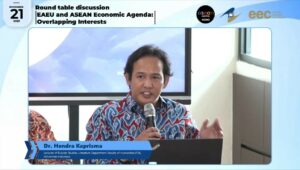Universitas Indonesia (UI) took part in the “Round Table Discussion EaEU and ASEAN Economic Agenda: Overlapping Interests” on Tuesday (21/11) in the Bagan/Ha Long Room, 5th Floor, North Tower of the ASEAN Secretariat, Jakarta. This activity marked the celebration of the fifth year of relations between the Eurasian Economic Union (EaEU) and ASEAN which was established through a Memorandum of Understanding between the European Economic Community (EEC) and the Association of Southeast Asian Nations (ASEAN) regarding economic cooperation in 2018.
This discussion discussed a detailed analysis of the economic agenda of each country involved in the EaEU and ASEAN and determined the most promising areas of economic cooperation for both. UI was represented by the Dean of the Faculty of Humanities (FIB) UI, Dr. Bondan Kanumoyoso; Vice Dean for Academic, Research and Student Affairs FIB UI, Dr. Untung Yuwono; Russian Studies Program teaching staff, FIB UI, Dr. Hendra Kaprisma and Dr. Ahmad Fahruroji.
The core points discussed in this discussion include economic strategies after 2025, promising areas for economic cooperation, accumulated experience of interaction between institutions, points of convergence in strategic planning as well as other areas of EAEU-ASEAN cooperation that may require further institutionalization .
Member of the Board, Minister for Integration and Macroeconomics of the Eurasian Economic Commission, H.E Sergey Glaziev, in his keynote speech quoted from the live streaming of the activity via the YouTube channel Евразийская экономическая комиссия (Eurasian Economic Commission) said, to strengthen collaborative relationship between the two organizations, it is necessary to hold discussions regarding the economic agenda of each country so that they can determine the same targets and use the same mechanisms in the process. “Trade statistics with countries in the ASEAN region show high potential for cooperation. Apart from that, infrastructure improvements are needed to deal with various obstacles that occur, including problems with payments, clearing, insurance, credit, transportation, logistics and the exchange of information regarding economic trade and investment opportunities,” said Glaziev.

Dr. Hendra Kaprisma conveyed his perspective through a social-focused discussion in the Environmental, Social, and Corporate Governance (ESG) component. According to Dr. Hendra, ESG is important for establishing long-term value and business resilience. On the other hand, ESG can also help companies reduce risks and possible crises that could befall the company. “The social component is still an issue that often arises in the world of work, for example issues of ethnicity, race, tribe, religion, and gender, thus according to him this needs to be taken seriously,” said Dr. Hendra.
He added that both countries in ASEAN and the EaEU must prioritize the use of ESG in their economic agenda, since according to data, both Russia and ASEAN countries have a background that is quite supportive of prioritizing the application of ESG. For example, regulatory performance, standardization of living, income distribution, and employee security are still less than optimal.
Dr. Hendra said ASEAN and the EaEU must work together to increase the implementation of ESG in the economic agenda. “ASEAN and EaEU must collaborate to improve the resolution of social problems, because this solution can support sustainable economic growth which in turn can produce long-term positive effects for the community,” said Dr. Hendra.



